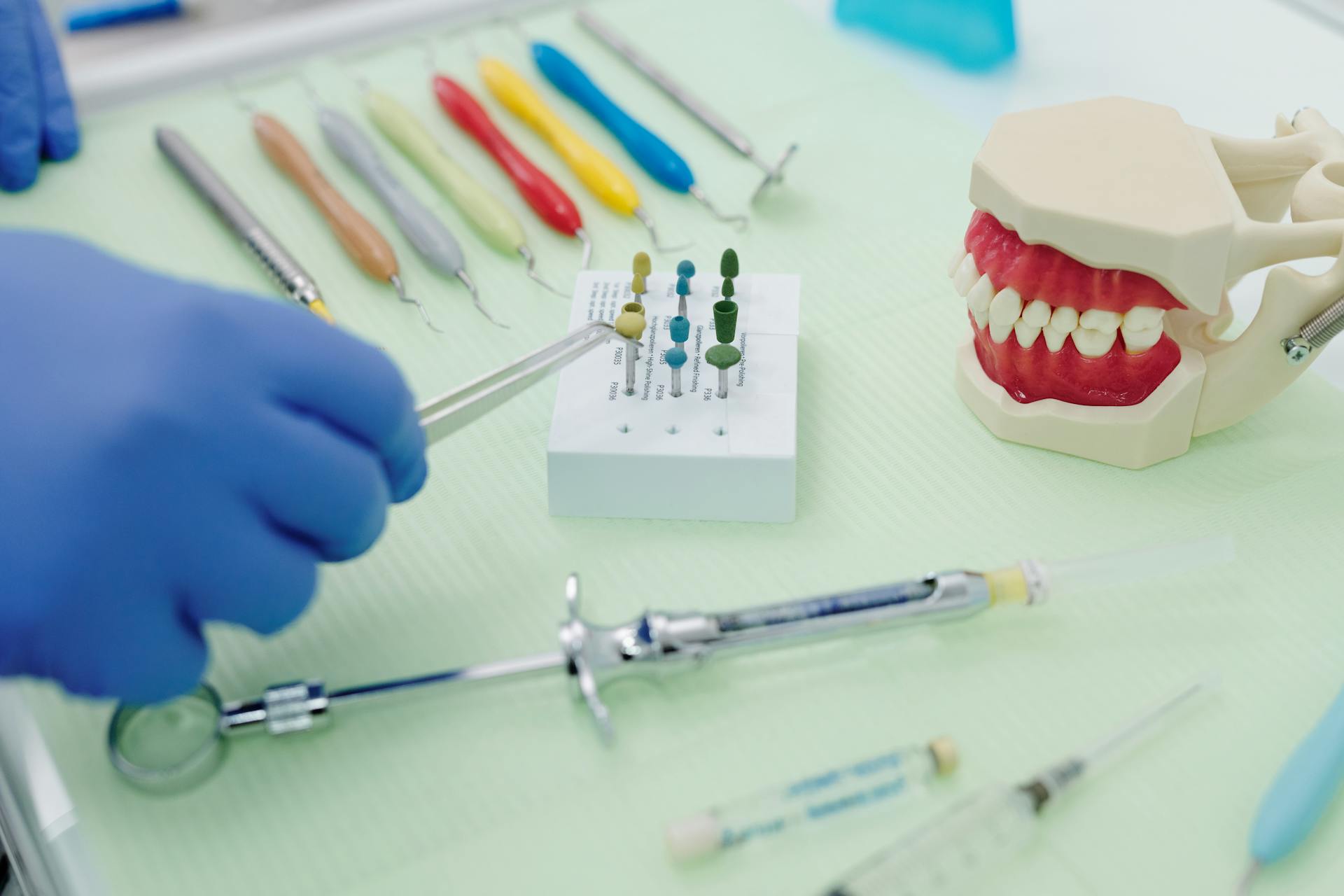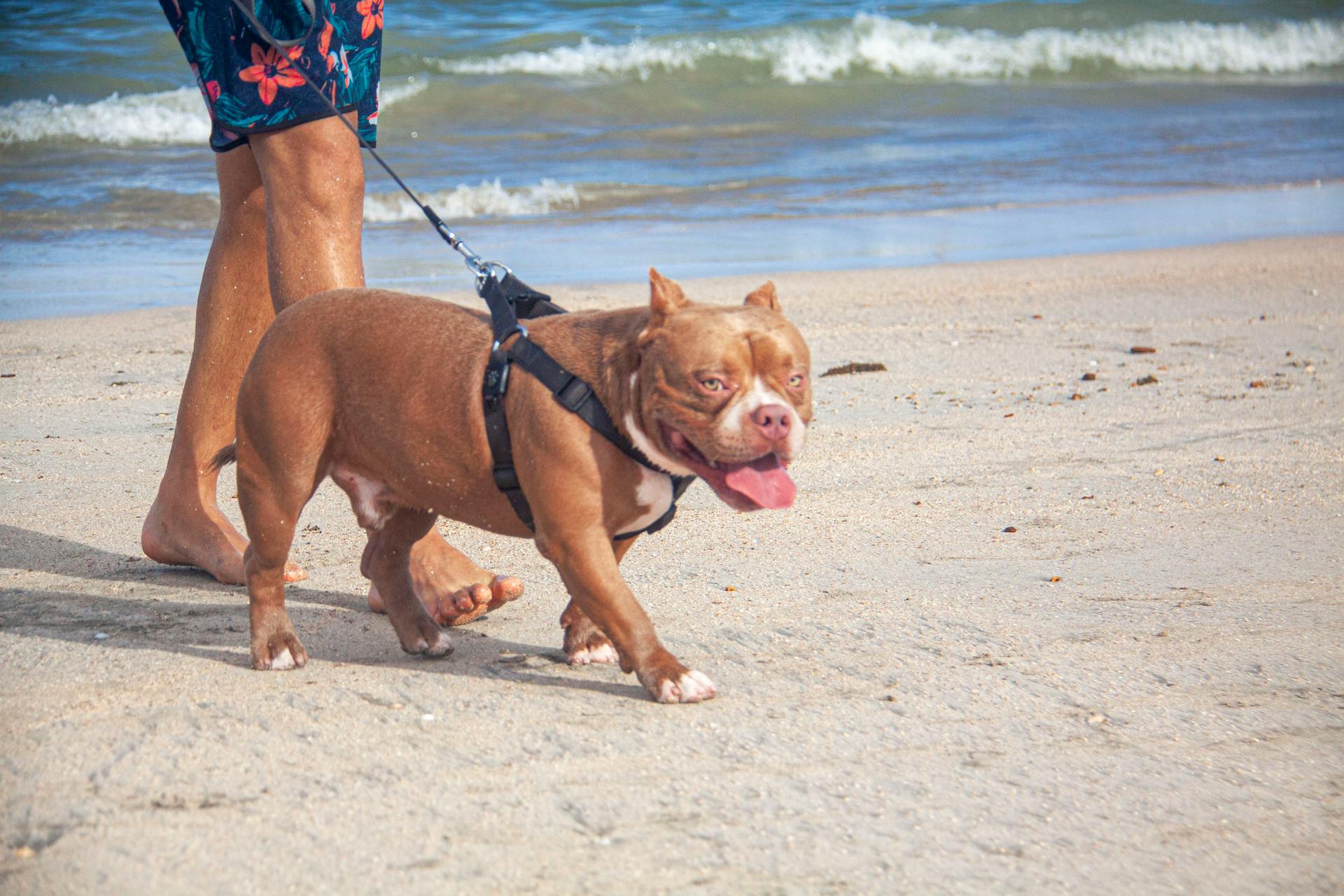
Masticatory muscle myositis is a rare but serious condition that affects dogs. It's characterized by inflammation of the muscles used for chewing, which can lead to severe symptoms.
The condition is most commonly seen in large and giant breed dogs, such as German Shepherds, Labradors, and Rottweilers. This is because these breeds are more prone to the underlying genetic issue that causes the condition.
Inflammation of the muscles can cause pain and stiffness in the jaw, making it difficult for dogs to eat or even open their mouths. In severe cases, the condition can lead to life-threatening complications.
Affected dogs may exhibit a range of symptoms, including difficulty swallowing, drooling, and a reluctance to eat.
Causes and Risk
Any age or breed of dog may be affected by masticatory muscle myositis (MMM), making it a common condition. Both male and female dogs are susceptible to MMM.
Young adult, large-breed dogs are most commonly diagnosed with MMM. This is likely due to their unique muscle fiber type.
Masticatory muscles contain a special type of muscle fiber called type 2M, which is different from the fiber types found in limb muscles. This unique fiber type may make masticatory muscles more prone to immune-mediated attacks.
Immune-mediated attacks occur when the body forms auto-antibodies against the type 2M fibers in the masticatory muscles. These auto-antibodies are directed specifically against the type 2M fibers, making them a key factor in the development of MMM.
In some cases, urinary tract, skin, or other infections may trigger an immunologic attack on the masticatory muscles. This is thought to occur because the antigens on the type 2M fibers may be shared with certain bacteria.
A unique perspective: Masticatory Muscle Myositis Dog Head Sunken in above Eye
Symptoms and Signs
Masticatory muscle myositis can be a challenging condition to recognize, but knowing the symptoms and signs can help you identify it early on.
The main symptoms of MMM include severe muscle pain, which can cause dogs to vocalize loudly when trying to open their mouths. Pain with jaw manipulation, difficulty picking up toys or food, and difficulty chewing are all common signs of MMM.
Additional reading: What Are Signs of Allergies in Dogs
Dogs with MMM may also exhibit reluctance to open their mouths, refusal to eat due to pain rather than reduced appetite, and drooling. Some dogs may even hold their mouths slightly open at rest, with saliva staining the fur around their mouths.
In the initial stage of MMM, dogs may experience fever, swollen local lymph nodes, and bulging eyes due to swollen muscles behind them. As the disease progresses, the muscles may become atrophied, leading to fibrosis and scarring.
Here are some common signs of MMM:
- Pain or difficulty opening mouth (trismus)
- Swelling of masticatory muscles
- Drooling
- Reluctance to eat due to pain
- Refusal to open mouth
- Vocalizing when trying to eat
- Swollen jaw and temple muscles
- Bulging eyes
- Fever
- Swollen local lymph nodes
It's essential to note that MMM can be misdiagnosed as a retroorbital abscess, leading to inappropriate treatment with antibiotics. If you suspect your dog has MMM, it's crucial to consult with a veterinarian for an accurate diagnosis and treatment plan.
On a similar theme: Lick Granuloma Dog Treatment
Testing and Diagnosis
Testing and diagnosis for masticatory muscle myositis can be a lengthy process. A definitive diagnosis is made with a specialized test that identifies antibodies to the muscle fibers.
This test includes a blood test and/or muscle biopsy, which can help rule out other possible conditions associated with reluctance or inability to open the mouth.
A complete physical and neurologic examination, general and specialized blood tests, and a muscle biopsy are also essential for a diagnosis.
The "2M antibody" test is a unique blood test specifically for masticatory muscle myositis.
The diagnostic process can be extensive and may include a battery of tests, including x-rays, urinalysis, and electromyography.
Here's a summary of the diagnostic tests for masticatory muscle myositis:
- Blood test
- Muscle biopsy
- Complete physical and neurologic examination
- General and specialized blood tests
- X-rays
- Urinalysis
- Electromyography
- "2M antibody" test
Recovery and Treatment
Recovery from masticatory muscle myositis requires long-term treatment with corticosteroids to suppress the immune system's attack on muscle fibers.
The goal is to taper the dose slowly over time, which can take at least six months. Relapses are common, and some dogs require lifelong treatment.
Treatment should not begin before thorough testing and diagnosis.
The standard course of treatment consists of heavy, lengthy doses of corticosteroids, such as prednisone, until the dog's jaw seems to open normally.
Then, the doses may be lowered gradually over six to nine months.
If the medication is discontinued too early, the dog may be expected to relapse.
So, sufficient dosages of corticosteroids need to be given and for a sufficient period of time.
In some cases, the dog may require additional treatment, such as pain medication, nutritional support with softened food or a feeding tube, and additional immunosuppressive medications.
Rarely, cases may spontaneously resolve.
Dogs that go into complete remission may never regain normal muscling of their heads.
Prolonged corticosteroid use can also lead to muscle atrophy.
The dog may require a semi-liquid diet during initial recovery.
Its mouth should not be forced open, but the dog should be encouraged to chew its toys, as a form of physical therapy.
Here are some common treatment options for MMM:
- Prednisone (prednisolone), a synthetic corticosteroid that serves as an immunosuppressant
- Azathioprine (Azasan, Imuran, Azamun, Imurel), another immunosuppressive drug
- Dexamethasone, which is approximately ten times stronger than prednisone
- Cyclosporine, another immunosuppressive drug
- Colchicine, which is used for its anti-fibrotic properties in liver disease
Prognosis of recovery from masticatory muscle myositis is determined by the degree of fibrosis present and the dog's response to treatment.
The prognosis is good if MMM is detected early, in the initial "acute" stage, and the treatment is appropriate, meaning mainly aggressive immunosuppressive therapy.
Frequently Asked Questions
What breeds get masticatory muscle myositis?
Large breed dogs, including German Shepherds, retrievers, and Doberman Pinschers, are prone to masticatory muscle myositis. These breeds are overrepresented among cases of this condition.
Is masticatory muscle myositis rare?
Masticatory muscle myositis is relatively rare, especially in puppies, where it's one of the least common inflammatory myopathies. However, it's more common in adult dogs.
How fast does masticatory myositis progress?
Masticatory myositis progresses rapidly, with initial swelling occurring within a week or two, followed by progressive muscle wasting. This rapid progression can lead to significant muscle loss if left untreated.
What to do if your dog has MMM?
If your dog has MMM, consult a veterinarian for proper treatment, which typically involves a long-term steroid regimen to manage symptoms. Treatment can be effective, but relapses are common and lifelong treatment may be necessary.
How long should a dog be on prednisone for MMM?
For dogs with Maxillo-Mandibular Merger (MMM), prednisone therapy typically lasts 3 to 4 weeks to restore masticatory function. After that, the dose is gradually tapered to the lowest effective amount.
Sources
- https://www.dvm360.com/view/masticatory-muscle-myositis-in-dogs
- https://en.wikipedia.org/wiki/Masticatory_muscle_myositis
- https://vetster.com/en/conditions/dog/masticatory-myositis
- https://www.vetlexicon.com/canis/musculoskeletal/articles/masticatory-myopathies/
- https://www.cavalierhealth.org/masticatory_muscle_myositis.htm
Featured Images: pexels.com

